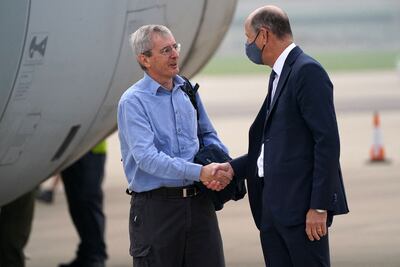Britain’s Foreign Office faces an official inquiry into its handling of Afghanistan, but already it is clear that its reputation has suffered severe damage.
As an institution, the Foreign Office once drew strength from calamity. The outbreak of the First World War was nothing but a diplomatic disaster. Yet, cast in stone in the walls of the building is a tribute to its leader when the conflict broke out, Edward Grey. “By uprightness of character, wisdom in council and firmness in action, he won the confidence of his countrymen, and helped to carry them through many and great dangers,” it proclaims.
Foreign Secretary Dominic Raab was photographed walking past the plaque last week. He has borne the brunt of criticism for the failure to see and react to events unfolding in Afghanistan. This time there can be no succour for the foreign affairs mandarins to draw.
The main reason is that just a year ago, the Foreign Office underwent a massive reorganisation under Mr Raab. It can now be seen that the structures, outlook, mindset and planning apparatus created then are not delivering. Mr Raab’s own leadership is failing to bear scrutiny. He had an open hand to shape the new Foreign Commonwealth and Development Office (FCDO) as he saw fit.
Much energy was about how personnel were moved from traditional specialisms in either foreign policy or development into combined roles. The new board, technology systems and rebranding absorbed many more working hours. The focus was strictly on how the institution would function. The website is filled with organograms and lists of agencies under its umbrella. You can, for instance, easily find out about the FCDO's energy consumption but not so much on what it is trying to do.
As former British prime minister Tony Blair said about the September 11, 2001 attacks, “all previous analysis has been made redundant”. A new grip must similarly be asserted over regional policy or extremist ideology and terrorism.
Looking internally at exactly the wrong time means the Foreign Office now struggles to show that it can make that root and branch shift. That is because the doctrines and mantras that have driven foreign policy are no longer viable responses. Take the doctrine of "responsibility to protect" for example.
"R2P", as it was popularly known, was espoused by Mr Blair, which essentially called for nations to engage in "humanitarian intervention" where it was required. In a 1999 speech in Chicago, he said: "The most pressing foreign policy problem we face is to identify the circumstances in which we should get actively involved in other people's conflicts." Evidently, R2P is something that belongs to an era of unipolar global power and plentiful resources.

The UK's ambition to lead even European affairs has since been split asunder, particularly by the 2016 Brexit vote.
Today, the aid budget the Foreign Office has at its disposal is not a tool that can be yielded to ensure or underpin alliances. Notwithstanding the fact that the UK cut its overseas spending in reaction to the Covid-19 pandemic, there is great competition for loyalties. Structurally the Chinese Belt and Road Initiative is but one of many competitors.
It is easy to see Afghanistan as a failure of intelligence, but that would be a misreading the role of the spooks. It is the Foreign Office, with its bigger, weightier policy and delivery body that draws from the information and uses the spies to achieve its goals.
The 2020 Integrated Review set out a role for the UK as a kind of quick-footed referee between nations, seeking to deliver diplomatic investment as well as effective short and long-run alliances and understanding between states. This approach relies on making well-timed choices on where to put diplomatic resources and how to orchestrate the situation to deliver the optimal objectives. It requires openness to circumstances but also a great dedication to the diplomatic arena.

Mr Raab has complained that he has been depicted both as someone not fully engaged with the challenges and as an overly controlling workaholic manager. His very need to exercise every decision calls into question the need for six junior ministers under his command. But the issue is not about Mr Raab. It is about how foreign and security policy is executed.
This is a moment for a new mission statement that puts purpose behind policy and then allots manpower and resources to deliver the goals. It would help to have guiding principles. It would be a good idea to find a way to junk some of the ideas that work in theory but not in practice.
The Afghanistan crisis highlighted that security and counter-extremism cannot be divorced from the issues of migration and development. The UK has great assets of history and understanding with many frontline nations. Behind the headlines about the Taliban, there is already a great scramble to ensure that the right support is in place for Pakistan as destabilisation spreads. The spillover is already happening, which is why the countries around Afghanistan have closed their borders.
The UK promised a tilt to the Indo-Pacific in the Integrated Review strategic outlook. Recent weeks have shown the desperate need for the Foreign Office to be at the forefront of that drive. Certainly, this was no time to be navel gazing at the internal reporting systems and the make-up of its managing board.


